Define “Early” and then Click a Link to Jump to a Solution:
Note: Without doing any of the fancy stuff below, brisket will take around 2 hours to rest from 200F > 160F while wrapped regardless.
Around 150-160F is when you want to slice as it’s cool enough to eat and it allows time for the juices to gelatinize.
If the Party is in a Few Hours (3-5): Create a Faux Cambro
Get some water to near boiling. Then pour this water into your cooler and close the lid for 10 minutes.
This pre-heats the cooler so the cooler doesn’t wick heat from the meat.
After 10 minutes, dump the water.
Grab 2 old towels or a bunch of dish rags. Line the bottom of the cooler with 1 towel.
Put wrapped meat on top.
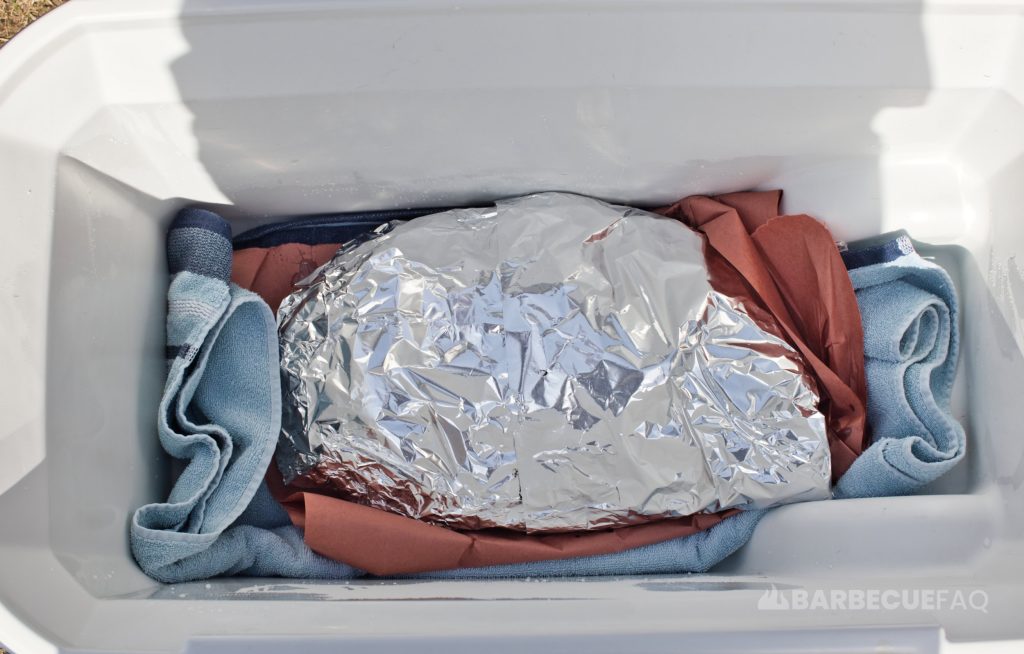
NOW would be the time to probe the meat to monitor internal temperature.
Our goal is to be above 140F internal for food safety.
Top the brisket with another towel.
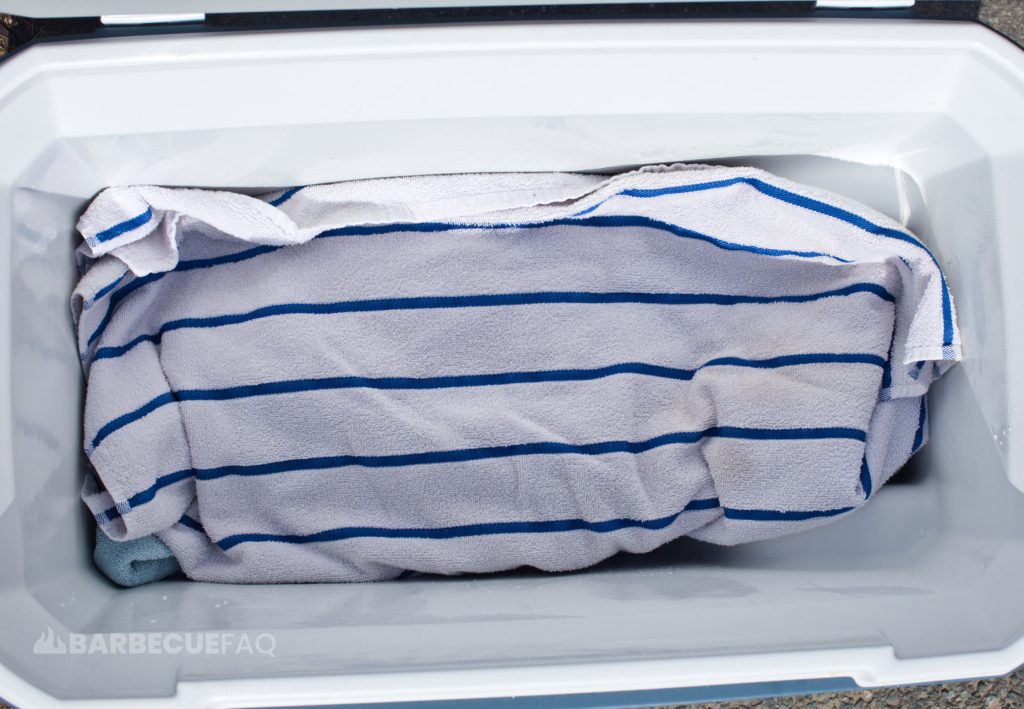
The towels work to insulate the meat and allow the internal temperature to come down slowly from 200F to 140-160F for slicing and serving.
This setup usually allows you to be above 140F for 6 hours but your cooler might be better than mine.
But Dylan, I Don’t Have a Cooler
Leave the brisket wrapped, grab an old towel and wrap the meat in it.
Get some water to near boiling in a large pot. Then put this pot on the bottom shelf in your oven.
Take your towel wrapped brisket and put it on a baking sheet and put this in the oven.
The water will add humidity to the oven and allow the brisket to slowly come down in temperature.
Done Several Hours Early (6+): You need to Hot Hold the Meat
From testing, I know my electric smoker set to 175F will keep food above 140F internal and max out at around 150F.
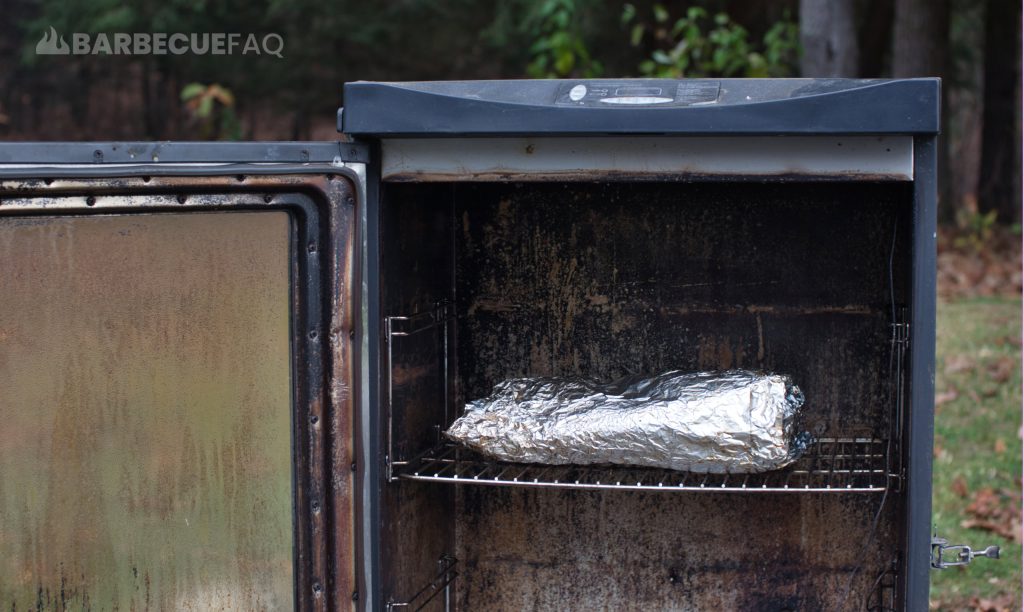
If you don’t have an electric smoker you need to test your device, you can use:
- Kitchen oven with a warming function (170F-ish)
- Kitchen oven at it’s lowest temperature setting (200F-ish)*
- Pellet grill at it’s lowest setting (200F-ish)*
- Toaster oven
*For these 2 options I’d use a wooden spoon to crack the door as both will swing in temperature and the slight crack will allow some heat to escape and keep the temperature down.
Once the brisket is tender, rest the meat down while wrapped to 160-170F internal.
Then pop into the holding device.
Use a probe thermometer to track internal temperature the entire time to ensure you’re above 140F.
If you start to dip below 145F, bump the temperature of your device by 10F.
A Day in Advance (12+ Hours): Hot Holding Safely
So you really have 2 options here:
1. When you go to tenderness check the meat and most of it is tender (~190-195F internal)
Simply drop the temperature of your holding oven to 175F and then put your brisket in without a rest.
This way, carry over cooking naturally occurs over 10-16+ hours.
The meat will continue to tenderize and then slowly come down in temperature.
2. If the whole brisket is probe tender
Rest down to 160F-ish for 2 hours while wrapped, set your holding oven to 175F and then put the wrapped brisket in to hot hold for 10-12+ hours.
Personally, I do option 1 almost every time I smoke brisket.
I find the meat is more tender and juicy and there’s less of a chance that you overcook the meat.
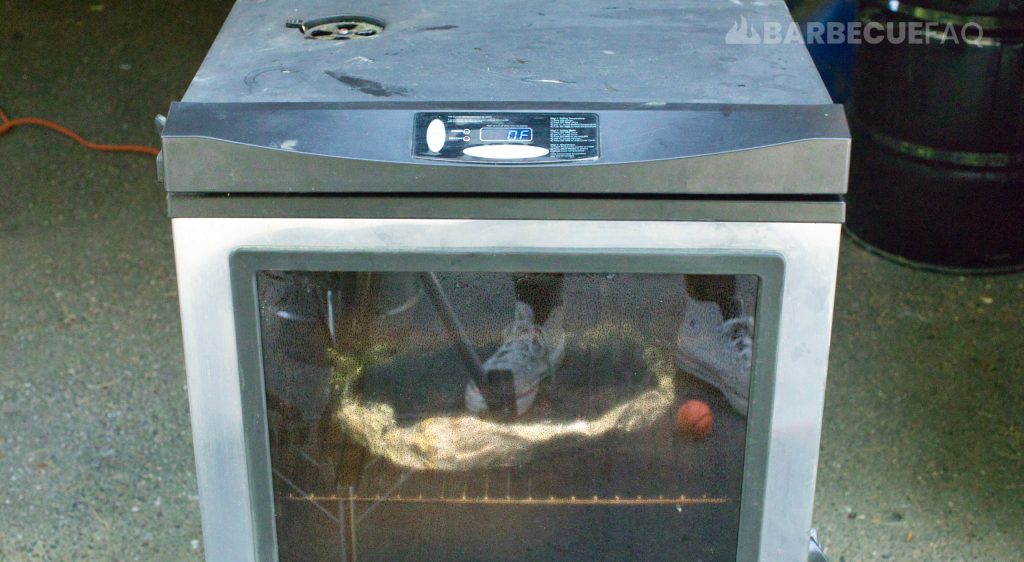
How Do Pitmasters and BBQ Restaurants Hold Brisket?
Pitmasters and BBQ restaurants make use of large offset smokers and in most cases are smoking 50+ briskets at one time.
Briskets go on the Pit at around 8/9 am and finish at around 10-12 pm.
Pitmasters then wrap the briskets in either foil, butcher paper, or plastic wrap. They then transfer them to something like a holding oven or warmer cabinet overnight for 10-11 hours for service at 11 am.
The next day at around 8/9 am they check for tenderness. If any feel like they need to further tenderize, they’ll bump the temperature of the warmer.
Popular warmer brands that you see in a lot of places are Alto-Shaam or Cres Cor.


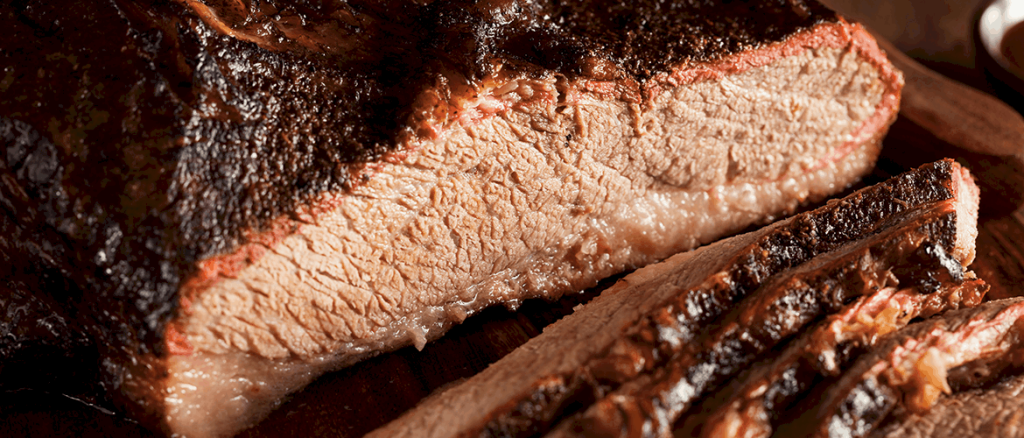

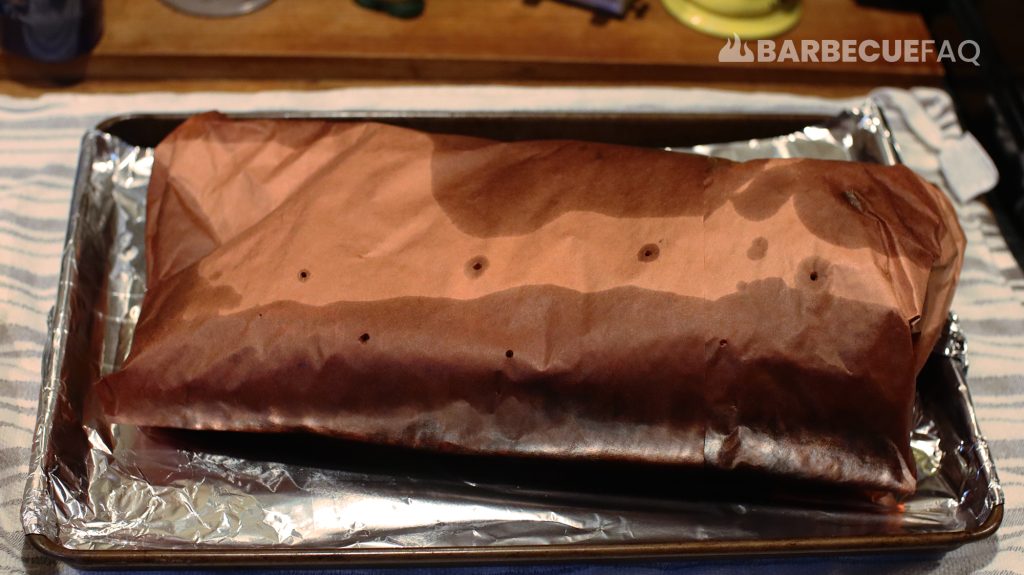
23 comments
Chris Karraker
I had what was supposed to be a hot and fast brisket be a low and slow brisket because my electric smoker was fight subzero temps and wind, put it in at 3pm, done next day at 6:40am, had to figure out real quick how I was going to rest this thing and then go to work. My oven does go as low as 175, so I set it to that and had the wife temp it 4 hours later and it was sitting at 175 degrees. We’ll see how it is when I get home.
Dylan Clay
So in your scenario, I would of tried to have it rested down on the counter to ~160F and then had the wife pop it in the oven @ 175F to hot hold just because it will continue to carry over cook when not rested and could possibly overcook.
Keep me posted with how it goes though Chris!
JT
Just wanted to say I used the slow hold method last night out of necessity. I cooked two briskets in my KBQ for about 8 hours, pulled and wrapped them in foil and placed them in the kitchen oven at 225 degrees. I separate the point and flat. Basically, the two flats and a point hit the desired temp at about 2 am, but the other point was still about 18 degrees behind. Therefore out of necessity I decided I’m was going to use the slow hold method for the last point. The point was about 183 degrees at 2 am, I set my kitchen oven to 170 and let it cook until 7 am. So, basically about 5 hrs. The brisket temp at 7 am was 182. The brisket that finished low and slow is the best brisket I have ever coked. I was restaurant quality tender. I can tell you that the owner of a BBQ joint in Abilene, TX states he pulls his briskets at 180 degrees and holds them at 180 degrees for up to 13 hours. This will be the way I cook my briskets moving forward. Dylan, thanks for the info that you have shared. It works to perfection!
Dylan Clay
Happy to help JT!
(I also do the same thing with pork butt and you’ll find the meat to be FAR juicer too).
The above also makes sense from a science perspective because all we’re doing is rendering collagen. At 160F+ the collagen (muscle fibers) start to break down into a gelatin.
AND most of the bark formation is also post-stall so 170-180F+.
Meaning, as long as you reach color you like and you’re above 160F+ for an extended period of time (usually I do overnight for afternoon eats) you’ll turn out moist and tender brisket in almost every case.
Cheers for your comment.
-Dylan
Stephen West
Excellent presentation/instruction about holding a cooked brisket. An uncomplicated and easy-to-understand method to hold a smoked brisket. One of the best I have seen.
Dylan Clay
Thanks for the comment Stephen, it’s greatly appreciated.
Sherman Smith
At what IT temp do you wrap the brisket, and do you recognize foil boat with top open or butcher paper?
Dylan Clay
Most people who wrap with a foil boat will go with 175-180F for wrapping simply to develop a better bark – as that’s the whole point of the method.
You want to leave the top exposed. You’re then using aluminum foil to surround the bottom of the brisket and then crinkling the edges. This leaves the fat cap exposed allowing it to continue to render.
Also by foil boating later into the stall (175F+) less tallow/water is collected in the boat. Wrapping too early will result in too much tallow collecting in the bottom.
Chris Wise
Love it and will give it a go.
Thanks
Jack S
If I only got my brisket up to 170 on the smoker can I finish it in the oven getting it to 200?
Dylan Clay
Hey Jack!
Absolutely. This is actually how I go about smoking all my briskets – usually I take them to ~175F and then transfer them to my electric smoker (which is a glorified outdoor oven). The brisket has no idea what it’s being cooked by and since it has already taken on enough smoke, it just needs heat and time to render collagen (aka your oven). At the end of the day electricity/gas is far cheaper than charcoal.
Dylan
Bill
Hi Dylan,
What temperature do Pit masters and BBQ restaurants hold the brisket at in the alto-shaam food warmers over night as you describe? Is it 145F?
Thanks
Bill
Dylan Clay
Hi Bill!
So it depends on the brisket as there’s usually two use cases like I said above – if they’re still tight, running a higher temperature will cause more carry over cooking and actually sus out those tight spots – most of these places are also following a “cook and hold” method where they’re finishing the brisket in the alto-shaam (which I outline above). These devices are also unlike an electric smoker where-in they control humidity AND temperature and they can also affect how heat functions inside the device – for instance, Alto-shaam uses “halo heat” as apposed to convective heat you’d experience in your oven.
However, these devices are borderline unrealistic to have in your home (mainly due to price). The best attempt at a home-brew solution I’ve seen is from Smoke Trails BBQ; Steve quite literally drilled through a chest freezer and installed a sous vide machine which he set to 150F. This holds the ambient within the chest freezer at 150F and as a result, the brisket also stays at 150F. Water has a much better heat carrying capacity than air – which is why a sous-vide machine works well. Where-as an electric smoker functions based on joule heating and will cycle temperatures. I’ve personally monitored mine at 145F and it’s fairly accurate (I’ll be taking photos of this soon to prove in this article).
With all that said though – 145/150 – 170F is usually at around what I’ve seen on these commercial devices in a retail setting.
If you’re following this guide, I’d strongly suggest calibrating your device with an ambient temperature probe to ensure it’s at the temperature it states.
Hope that helps!
Jace
Thanks in advance for your help. Love the holding for brisket. Can you hold pork butt and ribs the same way?
Dylan Clay
You absolutely can.
I do have planned articles for both of these but to give some quick advice: My biggest suggestion for something like pork butt is to go to around 190F as apposed to 200F+ and then resting (don’t pull the muscle and then hold either as you’ll oxidize the meat and dry it out – pull the day after). I personally find that the meat is more moist when smoked to 190F vs smoking to 200F+ to tenderness – granted, you could argue that since everything is pulled together it doesn’t tend to matter as much (even less so if you use a finishing sauce).
My recommendations are similar to ribs.
Tom
Thanks really helpful and well researched article, it gave me confidence to hold my brisket overnight in a cooler box.
Dylan Clay
Happy to help Tom!
Matthew Blair
What size is your MES? I’m wondering if the 30” ones which have like a 14.5” X 12” rack size is big enough to hold a cooked brisket, or if the brisket would be too big & require something the size of a MES 40?
Dylan Clay
Hey Matthew,
So I had to backtrack my receipt for when I purchased just to confirm for you (I bought it back in 2018). The specific Model I own is the Masterbuilt 20075315, 40-inch; Which I don’t think they make anymore.
In terms of the grates, I had to take out my tape measure, but they’re 19.5″ x 12″.
Honestly though, as long as you trim based on the size of your smoker, you should be able to make it fit. The brisket in this article was 12 lbs, trimmed down to around 10 lbs. Brisket also shrinks quite a bit.
There are even videos of Chud holding a brisket in a toaster oven. When looking at what he used, the dimensions someone mentioned internally are Outside to outside 11.625″ x 14.125″.
Meaning, I’d start with a smaller brisket 8-12 lbs and if you trim/shape it accordingly, I’m willing to bet you could hold it in your 30″ MES.
Hope the above helps!
Tucker
Thx for info. I need to try something like this for this weekend. I have a Masterbuilt elec but do my smoking on a Weber. So if I smoke on the Weber but use the elec smoker for keeping warm overnight, you’re saying to take out of butcher paper and just do a fool boat? And so I need to worry about wood chips or even the water pan? At that point the master built is basically an outdoor oven I guess.
Dylan Clay
Hey Tucker!
So, if you’re someone who uses Butcher Paper to beat the stall with, you can leave the brisket in the paper; The foil boat method is simply another way to beat the stall.
Also you won’t need any wood chips or a water pan. At this stage all you’re doing is rendering collagen in the meat. Since your brisket is wrapped in paper, the amount of smoke penetration is minimal. The smoke flavor comes from when you’re smoking on the Weber kettle. For this same reason, once I foil boat – in your case wrap in butcher paper – you can technically transfer the brisket to your Masterbuilt. At the end of the day, the brisket doesn’t know if it’s being cooked on the Kettle with Charcoal or heat via the electric heating element; Heat is Heat and BTU is BTU.
All you’re using the Masterbuilt for is to function – as you put it – as an outdoor oven. Remember too, electricity is much cheaper than charcoal.
Ross
Thanks for the great information. I have an electric and will be trying this. When resting, do you wrap the brisket in anything or leave the top exposed?
Dylan Clay
Cheers Ross. I leave the top exposed and leave the brisket in the foil boat.